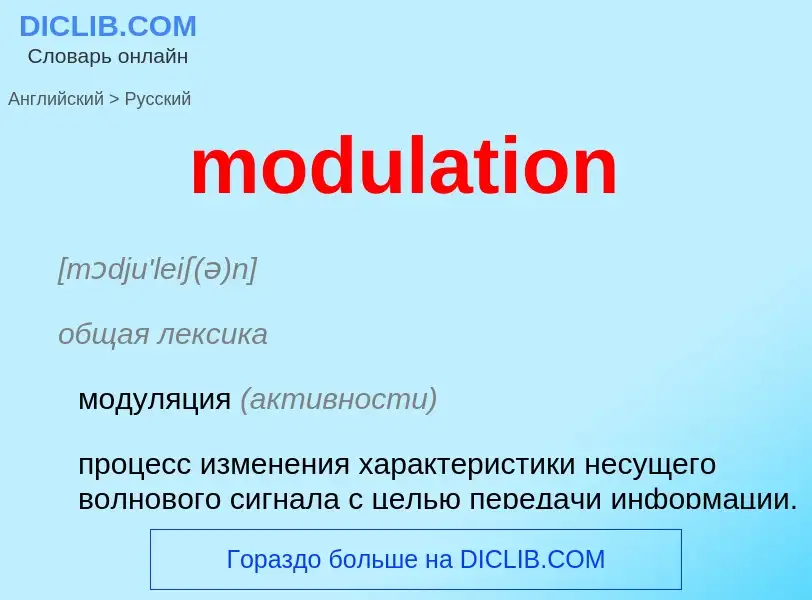Tradução e análise de palavras por inteligência artificial ChatGPT
Nesta página você pode obter uma análise detalhada de uma palavra ou frase, produzida usando a melhor tecnologia de inteligência artificial até o momento:
- como a palavra é usada
- frequência de uso
- é usado com mais frequência na fala oral ou escrita
- opções de tradução de palavras
- exemplos de uso (várias frases com tradução)
- etimologia
modulation - tradução para Inglês
[mɔdju'leiʃ(ə)n]
общая лексика
модуляция (активности)
процесс изменения характеристики несущего волнового сигнала с целью передачи информации. Для модуляции обычно используется амплитуда (AM), фаза или частота сигнала (FM)
модулирование
модуляционный
антоним
Смотрите также
существительное
специальный термин
модуляция
Wikipédia
In electronics and telecommunications, modulation is the process of varying one or more properties of a periodic waveform, called the carrier signal, with a separate signal called the modulation signal that typically contains information to be transmitted. For example, the modulation signal might be an audio signal representing sound from a microphone, a video signal representing moving images from a video camera, or a digital signal representing a sequence of binary digits, a bitstream from a computer.
The carrier is usually higher in frequency than the modulation signal. Higher frequency allow the signal to transmit more data. In radio communication, the modulated carrier is transmitted through space as a radio wave to a radio receiver.
Another purpose of modulation is to transmit multiple channels of information through a single communication medium, using frequency-division multiplexing (FDM). For example, in cable television (which uses FDM), many carrier signals, each modulated with a different television channel, are transported through a single cable to customers. Since each carrier occupies a different frequency, the channels do not interfere with each other. At the destination end, the carrier signal is demodulated to extract the information bearing modulation signal.
A modulator is a device or circuit that performs modulation. A demodulator (sometimes detector) is a circuit that performs demodulation, the inverse of modulation. A modem (from modulator–demodulator), used in bidirectional communication, can perform both operations. The lower frequency band occupied by the modulation signal is called the baseband, while the higher frequency band occupied by the modulated carrier is called the passband.
In analog modulation, an analog modulation signal is "impressed" on the carrier. Examples are amplitude modulation (AM) in which the amplitude (strength) of the carrier wave is varied by the modulation signal, and frequency modulation (FM) in which the frequency of the carrier wave is varied by the modulation signal. These were the earliest types of modulation, and are used to transmit an audio signal representing sound in AM and FM radio broadcasting. More recent systems use digital modulation, which impresses a digital signal consisting of a sequence of binary digits (bits), a bitstream, on the carrier, by means of mapping bits to elements from a discrete alphabet to be transmitted. This alphabet can consist of a set of real or complex numbers, or sequences, like oscillations of different frequencies, so-called frequency-shift keying (FSK) modulation. A more complicated digital modulation method that employs multiple carriers, orthogonal frequency-division multiplexing (OFDM), is used in WiFi networks, digital radio stations and digital cable television transmission.


![[[Waterfall plot]] of a 146.52 MHz radio carrier, with amplitude modulation by a 1,000 Hz sinusoid. Two strong sidebands at + and - 1 kHz from the carrier frequency are shown. [[Waterfall plot]] of a 146.52 MHz radio carrier, with amplitude modulation by a 1,000 Hz sinusoid. Two strong sidebands at + and - 1 kHz from the carrier frequency are shown.](https://commons.wikimedia.org/wiki/Special:FilePath/Waterfall AM.jpg?width=200)
![A carrier, frequency modulated by a 1,000 Hz sinusoid. The [[modulation index]] has been adjusted to around 2.4, so the carrier frequency has small amplitude. Several strong sidebands are apparent; in principle an infinite number are produced in FM but the higher-order sidebands are of negligible magnitude. A carrier, frequency modulated by a 1,000 Hz sinusoid. The [[modulation index]] has been adjusted to around 2.4, so the carrier frequency has small amplitude. Several strong sidebands are apparent; in principle an infinite number are produced in FM but the higher-order sidebands are of negligible magnitude.](https://commons.wikimedia.org/wiki/Special:FilePath/Waterfall FM.jpg?width=200)
